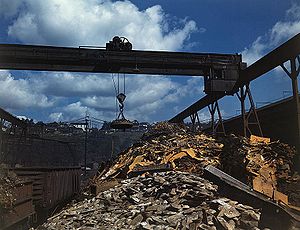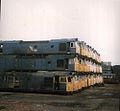- Scrap
-
"Scrap metal" redirects here. For other uses, see Scrap Metal (disambiguation).
3R Concepts Scrap is a term used to describe recyclable and other materials left over from every manner of product consumption, such as parts of vehicles, building supplies, and surplus materials. Often confused with waste, scrap, in fact, has significant monetary value. Overall, the scrap industry processes more than 145,000,000 short tons (129,464,286 long tons; 131,541,787 t)[original research?] of recyclable material each year into raw material feedstock for industrial manufacturing around the world. In 2007, the United States exported over $10 billion worth of scrap steel.[1]
Contents
Role in the American Economy
The scrap industry contributed $65 billion in 2006 and is one of the few contributing positively to the U.S. balance of trade, exporting $15.7 billion in scrap commodities in 2006. This imbalance of trade has resulted in rising scrap prices during 2007 and 2008 within the United States.[2] Scrap recycling also helps reduce greenhouse gas emissions and conserves energy and natural resources. For example, scrap recycling diverts 145,000,000 short tons (129,464,286 long tons; 131,541,787 t) of materials away from landfills. Recycled scrap is a raw material feedstock for 2 out of 3 pounds of steel made in the U.S., for 60% of the metals and alloys produced in the U.S., for more than 50% of the U.S. paper industry’s needs, and for 33% of U.S. aluminum. Recycled scrap helps keep air and water cleaner by removing potentially hazardous materials and keeping them out of landfills.
How scrap is processed
 Piles of scrap metal being utilized for the World War II effort, circa 1941
Piles of scrap metal being utilized for the World War II effort, circa 1941
Scrap metal originates just as frequently between businesses and homes as well. The proper disposal and recycling of scrap metal is typically done by a business or service. Typically a "scrapper" will advertise his services to conveniently remove scrap metal for people who don't need it, or need to get rid of it.
Scrap is often taken to a wrecking yard (also known as a scrapyard, junkyard, or breaker's yard), where it is processed for later melting into new products. A wrecking yard, depending on its location, may allow customers to browse their lot and purchase items before they are sent to the smelters although many scrap yards that deal in large quantities of scrap usually do not, often selling entire units such as engines or machinery by weight with no regard to their functional status. Customers are typically required to supply all of their own tools and labor to extract parts, and some scrapyards may first require waiving liability for personal injury before entering. Many scrapyards also sell bulk metals (stainless steel, etc.) by weight, often at prices substantially below the retail purchasing costs of similar pieces.
In contrast to wreckers, scrapyards typically sell everything by weight, rather than by item. To the scrapyard, the primary value of the scrap is what the smelter will give them for it, rather than the value of whatever shape the metal may be in. An auto wrecker, on the other hand, would price exactly the same scrap based on what the item does, regardless of what it weighs. Typically, if a wrecker cannot sell something above the value of the metal in it, they would then take it to the scrapyard and sell it by weight. Equipment containing parts of various metals can often be purchased at a price below that of either of the metals, due to saving the scrapyard the labor of separating the metals before shipping them to be recycled. As an example, a scrapyard in Arcata, California sells automobile engines for $0.25 per pound, while aluminum, of which the engine is mostly made, sells for $1.25 per pound.[citation needed] Scrap prices are reported in a handful of U.S. publications, including American Metal Market, based on confirmed sales. Non-US domiciled publications, such as The Steel Index, also report on the US scrap price, which has become increasingly important to global export markets.
Risks
Great potential exists in the scrap metal industry for accidents in which a hazardous material, which is present in scrap, causes death, injury, or environmental damage. A classic example is radioactivity in scrap; see the Goiânia accident and the Mayapuri radiological accident as examples of accidents involving radioactive materials, which entered the scrap metal industry and some details of the behavior of contaminating chemical elements in metal smelters. The general nature of many of the tools used in scrapyards such as Alligator shear, which cut metal using hydraulics give themselves the need for safety.
Benefits of Recycling Scrap Metals
According to research conducted by the US Environmental Protection Agency, recycling scrap metals can be quite beneficial to the environment. Using recycled scrap metal in place of virgin iron ore can yield[3]:
- 75% savings in energy
- 90% savings in raw materials used
- 86% reduction in air pollution
- 40% reduction in water use
- 76% reduction in water pollution
- 97% reduction in mining wastes
Every tonne of new steel made from scrap steel saves:
- 1,115 kg of iron ore
- 625kg of coal
- 53kg of limestone
Energy savings from other metals include:
- Aluminium savings of 95% energy
- Copper savings of 85% energy
- Lead savings of 65% energy
- Zinc savings of 60% energy
The metal recycling industry encompasses a wide range of metals. The more frequently recycled metals are scrap steel, iron (ISS), lead, aluminum, copper, stainless steel and zinc. There are two main categories of metals: ferrous and nonferrous. Metals which contain iron in them are known as Ferrous where metals without iron are nonferrous. (ISRI Common nonferrous metals are copper, brass, aluminum, zinc, magnesium, tin, nickel, and lead. Nonferrous metals also include precious and exotic metals. Precious metals are metals with a high market value in any form, such as gold, silver, and platinum. Exotic metals contain rare elements such as cobalt, mercury, titanium, tungsten, arsenic, beryllium, bismuth, cerium, cadmium, niobium, indium, gallium, germanium, lithium, selenium, tantalum, tellurium, vanadium, and zirconium. Some types ofmetals are radioactive. Thesemay be “naturally-occurring” ormay be formed as by-products of nuclear reactions.Metals that have been exposed to radioactive sourcesmay also become radioactive in settings such asmedical environments, research laboratories, or nuclear power plants. OSHA guidelines should be followed when recycling any type of scrap metal to ensure safety.
Gallery
-
British Rail locomotives stacked awaiting scrapping.
See also
- Recyclable waste
- Heavy melting steel
- Ship breaking
- Metal theft
References
OSHA Guidelines for Recyling Scrap Metal
- ^ "Scrap Metal Includes Gold and Platinum". http://scrappingmetal.blogspot.com/p/how-to-start-scrapping-metal.html. Retrieved 2008-08-28.
- ^ "American Scrap Coalition Crisis". http://www.scrapcoalition.com/crisis.htm. Retrieved 2008-08-28.
- ^ "Benefits of Recycling Scrap Metal". http://www.norstar.com.au/Recycling/Processing/Benefits.aspx. Retrieved 2011-04-04.
External links
- Scrap at the Open Directory Project
Categories:
Wikimedia Foundation. 2010.








